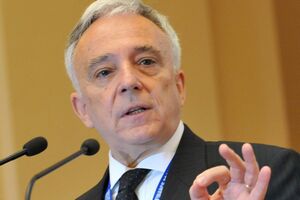Speech by Mugur Isarescu, NBR Governor, at the Conference “Economic Governance in the European Union” |
Autor: Bancherul.ro
2011-06-12 12:44 |
|
 Conference “Economic Governance in the European Union”
Conference “Economic Governance in the European Union”
Banca Natională a României
Bucharest, 10 June 2011
Speech by Mugur Isărescu, NBR Governor
Ladies and Gentlemen,
Distinguished audience,
It is a pleasure be the host of the Conference on “Economic Governance in the European Union”, an event jointly organized by the European Commission, the Ministry of Finance and the National Bank of Romania.
We are glad to welcome you all and our special guests: Mr. Gheorghe Ialomitianu – the Romanian Minister of Finance, Mrs. Elena Flores, Director for Policy Strategy and Coordination in the European Commission’s DGECFIN, Mr. Theodor Stolojan, Member of European
Parliament and former Prime Minister of Romania, Mrs. Iuliana Dascalu, Director in the Finance Ministry of Romania, Mr. Hans Martens, chief executive of the European Policy Centre Thinktank and Mr. Daniel Dăianu, Economics Professor, former Member of European Parliament and Finance Minister of Romania.
A special note of thanks to my colleagues Deputy Governor Cristian Popa and the Chief Economist Valentin Lazea, who, together with our special guests, have responded to the challenge of debating a hot topic.
In these challenging times, economic governance was brought to the spotlight by the recent global economic and financial crisis.
Governance may be seen as the manner in which power is exercised in the management of a country’s social and economic resources for development. We all know that good governance involves setting adequate policies, programs and regulations, which then have to be translated into legislation.
As I often say, sustainable development hinges on the consistency of
economic policies - there is no substitute for consistent, sound and stability-oriented economic policies.
In this context, institutions are central to the way a country is governed and these are the formal and informal rules in a society. As the Nobel Prize winner Douglas North pointed out “the formal rules are set by the state through laws and regulations, while the informal rules come from the culture, history and experience of each society”.
Only in the last 10-15 years most economists have discovered good governance – with its four pillars: transparency, accountability, predictability and participation - as a major determinant of economic growth. Thus, economic governance implies the need to ensure stable,
transparent and predictable rules that encourage competition and fair access to public services.
It is achieved through a country’s public and private sector institutions and the civil society.
Moreover, the recent international crisis has underscored the need for an in-depth reform of economic governance at both European and global levels. As the European Central Bank president, Mr. Jean-Claude Trichet has recently underlined “the international interdependencies are too large for purely national or regional rules to be optimal and there is a
clear need to strengthen global governance, in particular in the financial field”.
In the case of the European Union, the crisis has exposed fundamental weaknesses of the European economy, revealing growing internal imbalances. The functioning of the European Monetary Union has been under particular stress as the existing surveillance procedures proved
to be not comprehensive enough.
Therefore, more effective economic governance in the European Union and the euro area is seen as achievable through five main pillars: fiscal discipline, broader economic surveillance, closer coordination, a robust framework for crisis management, stronger institutions and rules-based decision making.
At this point, let me say that just recently the European Union has taken important decisions to ensure that Member States coordinate their economic policies more closely.
The new economic governance is therefore based on three main responses to the crisis:
• reinforcing the common economic agenda with closer European Union surveillance
• safeguarding the euro area stability
• and repairing the financial sector
As a result of these decisions, the EU’s interdependent economies will be better placed to chart a path to growth and job creation.
To conclude, I would like to emphasize here that economic governance is a topic that concerns us all. I would say it is all about discipline – particularly fiscal discipline, and a changing culture.
I am sure that, under the umbrella of this complex topic, all these issues are full of substance so that I strongly encourage participants to debate on the challenges the European Union, in general, and countries like Romania, in particular, face when it comes to economic governance.
I wish you success and invite Mr. Gheorghe Ialomitianu, Romania’s Minister of Finance, to deliver his address.
10 June 2011
|
|

